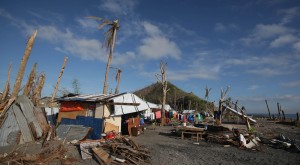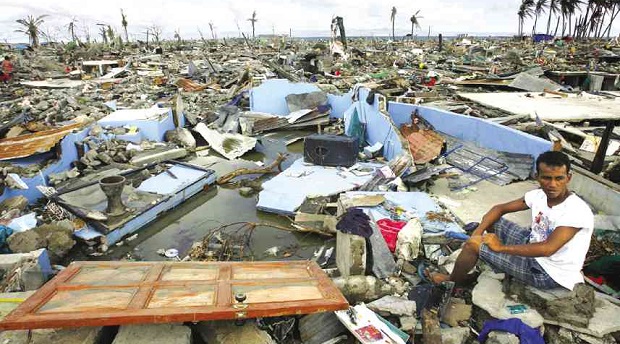Aquino gets own share of disasters: ‘Yolanda,’ Bohol quake, ‘Glenda’
MANILA, Philippines—In one fell swoop, a super typhoon of unprecedented strength converted Eastern Visayas into a wasteland. Nearly a month before, a titanic earthquake brought down centuries-old churches in Bohol. Eight months later, blasts of air shut down Metro Manila.
On Monday, President Aquino is expected to boast his administration’s accomplishments in his penultimate State of the Nation Address. But how about the state of the survivors of the major natural disasters that struck half past his term?
Perfect storm
Building up its strength in the oceans off the Philippine coast as a low pressure area, Super Typhoon Yolanda (international name: Haiyan) became a mega-storm.
Yolanda made its first landfall on Nov. 8, 2013, in Guiuan, Eastern Samar, with winds reaching a top strength of 315 kilometers per hour— the strongest tropical cyclone on record to make landfall in world history.
Article continues after this advertisementWithin a single day of devastation, Yolanda claimed 6,268 lives, with 28,689 casualties and 1,061 people missing, according to the final bulletin of the National Disaster Risk Reduction and Management Council (NDRRMC) dated March 14, 2014.
Article continues after this advertisement
A typhoon survivor, right bottom, cuts wood outside their newly built makeshift house at typhoon-ravaged Tolosa town, Leyte province. AP FILE PHOTO
Yolanda affected a wide swath traversing nine regions (Calabarzon, Mimaropa, Bicol, Western Visayas, Central Visayas, Eastern Visayas, Northern Mindanao, Davao, and Caraga)
The NDRRMC reported that 3,4254,593 families, or 16,078,181 people, were affected by the super typhoon, with 20,924 families, or 101,527 people, forced to live in 381 evacuation centers.
A total of 550,928 houses were totally destroyed and 589,404 partially damaged.
Looking at its impact on the economy, P39.8 billion of total loss were reported with P19.6 billion coming from infrastructure losses and P20 from the agricultural sector.
On Nov. 11, 2013, President Aquino declared a state of national calamity.
The jolt
Less than a month before Yolanda, a magnitude-7.2 earthquake hit Bohol province on Oct. 15, 2013. It jolted areas in Central Visayas, including the neighboring Cebu province.
According to the NDRRMC’s final bulletin on the earthquake, dated November 3, 2013, the earthquake took 222 lives and injured 976 people. It also caused the disappearance of eight persons.
Bohol took the brunt, recording 209 fatalities, 877 injured, and eight missing.
The temblor destroyed 14,512 houses and left 58,490 others partially damaged.
Also, the earthquake affected 671,103 families, or 3,221,248 people, of which 71,822 families, or 348,507 people, were displaced. The total cost of damage to properties and infrastructure reached P2.3 billion.
The earthquake also tore down two important icons of Filipino Catholicism—the centuries-old churches of Loboc and Baclayon.
Winds of the season
Gaining strength in the oceans, Typhoon Glenda (international name: Rammasun) zeroed in on the National Capital Region and parts of Luzon including the Bicol Region.

Glenda took away 98 lives during her one-day wrecking party in the country and injured 630 while causing the disappearance of five people.
According to the NDRRMC, 887,391 families, or 4,002,987 people, were affected with 5,713 families, or 27,380 people, staying in 115 evacuation centers as of July 24.
Glenda uprooted ancient trees and downed power lines, plunging Metro Manila and the other affected areas into darkness for over a week.
Glenda caused a total of P10.8 billion worth of damage, with P1.6 billion in infrastructure and P9.2 billion in agriculture.
Originally posted at 4:32 am | Monday, July 28, 2014
RELATED STORIES
